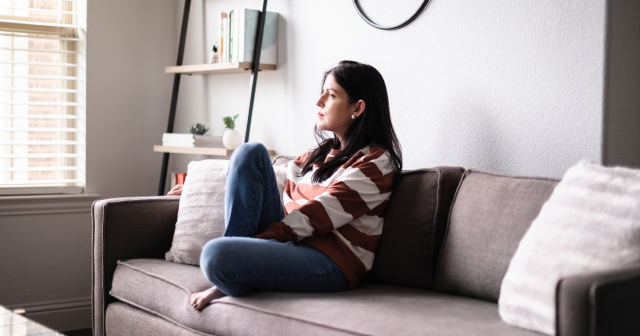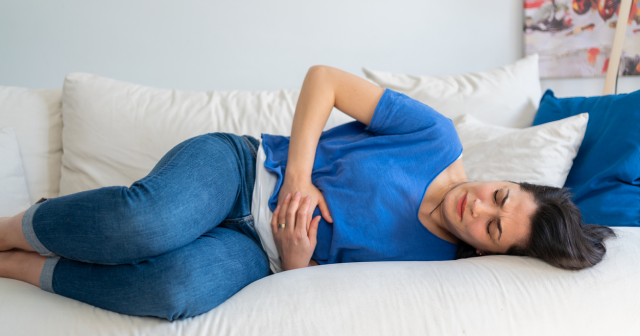Can sleep problems be related to menopause?
Insomnia is when you regularly have trouble sleeping. You might have difficulty falling asleep or staying asleep, or still feel tired when you wake up.
A lot of people have insomnia, but you’re more likely to get it when you’re older. And if you’re going through the menopause or the time leading up to it (perimenopause), it’s common for sleep problems to get worse.
So read on to learn more about why menopause can cause insomnia, what you can do to improve your sleep, and what treatment options are available.
What causes insomnia during menopause?
During the perimenopause and menopause, your levels of the hormone oestrogen change and gradually get lower.
These hormonal changes can not only lead to sleep disturbances, but the other symptoms they cause, such as hot flushes, night sweats and mood swings, can also interfere with your sleep.
In particular, hot flushes and night sweats are a common cause of insomnia during perimenopause.

There are also other reasons you might have insomnia during this time of your life, which are not linked to hormone changes. These include medical conditions, such as long-term (chronic) pain, obstructive sleep apnoea, restless leg syndrome, anxiety or depression, and life issues, such as work stress, financial worries or relationship difficulties.
How long does menopause insomnia last?
If your insomnia is linked to the hormonal changes of menopause, it will often gradually settle once your hormones have stabilised, although this can take a long time. If it’s caused by other problems, it can sometimes last for months or even years, if you don’t take steps to manage it.
When to see a doctor with insomnia
Make an appointment to see your doctor if you're finding it difficult to get to sleep or stay asleep and it's very bad or it’s affecting your daily life – especially if it’s been a problem for over a month. You should also see a doctor if you're feeling very low in mood or very anxious.
They’ll ask about your sleeping habits, your mood and your lifestyle, including diet, how much alcohol and caffeine you drink, exercise and stress levels. They’ll also check your medical history and consider any other conditions or medication that could be linked to your sleep problems.
How can I sleep better during menopause?
Depending on what’s causing your menopause sleep problems, there are a number of ways insomnia can be managed and treated, including medication and lifestyle changes.
Hormone replacement therapy (HRT)
If your sleep problems are caused by the hormonal changes of perimenopause or menopause, your doctor may suggest hormone replacement therapy (HRT). This can reduce or prevent menopause symptoms such as night sweats and hot flushes, which often cause insomnia.
Lifestyle changes
There are certain measures, sometimes known as ‘sleep hygiene’, which can help you improve your sleep. They include:
Creating a comfortable sleeping environment
- make sure your bedroom is quiet, and isn’t too hot or cold
- use your bedroom for sleeping and sex only
- keep bright lights to a minimum
- avoid using electronic devices with screens for 2 hours before bed
- avoid checking or watching the time throughout the night
Keeping to a regular sleep schedule
- go to bed when you are sleepy and avoid going to bed too early
- wake up and get out of bed at the same time every morning, including at weekends and after a poor night's sleep
- avoid taking naps during the day
- do something to help you relax before going to bed, such as reading a book or having a bath
You should also try to avoid caffeine after midday, and nicotine, alcohol and big meals within 2 hours of bedtime.
Regular exercise can help with sleep, but it’s best avoided within 4 hours of bedtime.
Therapy
If changing your sleeping habits doesn't help, your doctor may be able to refer you for a type of cognitive behavioural therapy (CBT) that's specially designed for people with insomnia.
Medication
Medications such as sleeping tablets aren’t usually recommended for insomnia, as they can lead to serious side effects and you can become dependent on them. But they might be used for a short time on rare occasions. They will only be prescribed for a few days, or weeks at the most, if your insomnia is very bad or other treatments haven’t worked.
Your health questions answered
Does melatonin help with menopause sleep?
 Answered by: Dr Roger Henderson
Answered by: Dr Roger HendersonMelatonin is known to help improve your normal sleep cycle. A form of modified-release melatonin is available on prescription, but it’s only licensed for people aged 55 and over, so it often isn’t suitable if you’re having sleep problems linked to menopause. If it is suitable, your doctor can prescribe tablets that release melatonin gradually into your body during the night. It's important to follow the instructions, and you'll usually only take it for a few weeks to help with short-term insomnia.
Does melatonin cause weight gain?
 Answered by: Dr Roger Henderson
Answered by: Dr Roger HendersonNo, melatonin doesn’t cause weight gain. However, low levels of melatonin in your body, which can happen during autumn and winter, can increase your appetite and so may cause weight gain. When you’ve gone through the menopause, your natural melatonin decreases, so this may have an impact on weight gain after the menopause.
Key takeaways
- insomnia is common during the perimenopause and menopause
- it can be linked to hormonal changes and menopause symptoms such as hot flushes, as well as other medical problems or stresses
- hormone replacement therapy (HRT) can reduce or prevent menopausal symptoms
- lifestyle changes can be effective in treating insomnia
- sleeping tablets aren’t usually recommended for insomnia
Want more tips on how to sleep like a baby? Try out our 28-day in-app sleep better plan for all the latest hacks on how to drift off more quickly and have better quality slumber. Currently available on iOS only.







